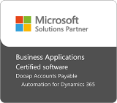
The days of old-school number-crunching are over. In my own experience, I’ve seen firsthand how much clout and mystery there previously was around the role of CFOs and their supporting finance teams. The team was always sitting behind closed doors making sure no one could approach them and even if folks could, they didn’t dare. Oddly, these types of finance teams didn’t really add any value to the organization, rather they created inconvenience for everyone.
Back in the day the business environment wasn’t as dynamic or fast moving as it is today. Calculating profits for the previous periods was sufficient. Processes were more important than insights, and those processes really took time. CFOs took pride in how complex and time consuming it was to come up with the profit and loss statement, which in the end did not add much value. Rather, when finalized, it was old news already.
So, what has changed? First of all, if you recognize yourself or your organization from the earlier description let me a share a secret – you’re still living in the 80s – whether you like it or not. Secondly, calculating past earnings is not complicated or time consuming anymore. Now, the modern CFO must be a champion of technology who automates the basic finance processes. You don’t need much time or many pairs of hands for basic recurring processes– you need a vision and the capability to implement change.
Managing change in the modern business revolves around two important subjects: people and technology, in that order. Running the best finance organization truly requires you understand what drives your people. It’s no different from any other part of the organization. At times, finance folks carry more legacy than other parts of the business and are typically risk-averse – this means that the CFO needs to explain things rather than dictate what they’re doing next. It’s about leading and coaching, not just managing. Once the reasoning is thoroughly explained and understood by the team, tackling the technology part is much easier. Technology is just another tool to fulfill the vision, nothing more or nothing less. There’s an abundance of tools and solutions out there to choose from. However, once you know what you’re doing all those decisions become a lot easier.
A CFO’s job is no longer just to explain the numbers, it’s understanding the business and the underlying societal drivers generating it. A modern CFO is there to serve, not to be served. Why do I say this? First of all, a CFO has quite a unique position in a company –typically number two after the CEO. Since CFOs don’t really have a business responsibility (other than the finance business) they can take a bird’s eye view on pretty much everything else that is going on in your company. Secondly, CFOs have the visibility to all areas of the business other C-level executives may lack. That gives CFOs a distinctive position to analyze the business operations and environment. The question is, can the CFO capitalize on the benefits of the position?
How does a CFO do that? To begin with, as mentioned, it goes way beyond the numbers. Not everybody has the built-in interest in business or thinking outside the box, but the nature of the CFO role provides much better building blocks compared to their colleagues.
As a modern CFO, it requires you to step out of your comfort zone. Surely it takes a while to get there, but who said life is supposed be easy?
Making a shift starts with the little things, like sharing your unique perspective on something happening in the business from the CFO viewpoint. You might consider you have no right in sharing thoughts or opinions in a particular area, but no one else has such a rare vantage point of the business as a whole. That’s the beauty of it. Because CFOs are not involved in the 24/7 day-to-day business activities, you have the opportunity to provide alternative views when asked and sometimes even when not asked. That’s when you, as a CFO, really begin to start adding value to the organization.
What’s the outcome then? You’ll become the trusted advisor for the business, no longer in the back-office role only concerned about accounting and financials. Become the go-to advisor when your organization doesn’t quite know what the right thing to do might be. I can tell you, that’s a lot more interesting than antiquated number-crunching. Are you ready for the change?
What is AP Automation?
We've gathered everything you need to know about Accounts Payable Automation on one page. If you're ready to learn, just click the button below!








